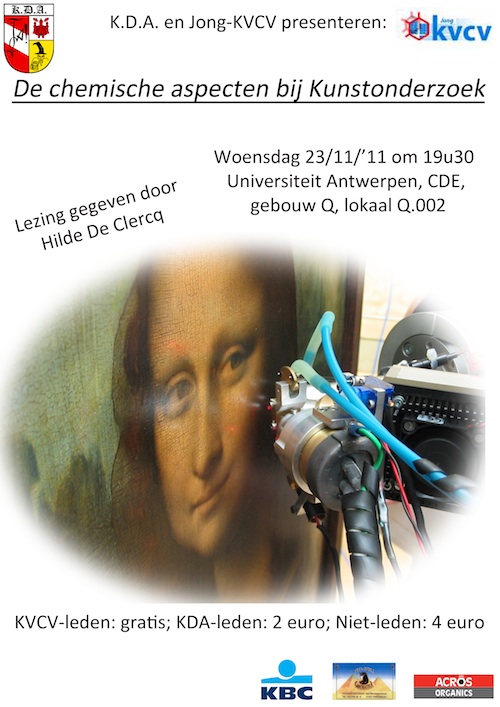Avondlezing over de chemische aspecten van het kunstonderzoek
Door Hilde De Clercq
Established in 1948, the Royal Institute for Cultural Heritage is one of ten scientific institutions falling within the competence of the Federal Ministry of Scientific Policy. IRPA is committed to the inventory, the scientific study, the conservation and the promotion of the country's artistic and cultural property. The Institute, whose chief mission is research and public service, represents a unique instrument for the heritage of our country, both movable and immovable.
Three departments group art historians, photographers, chemists, physicists and conservator-restorers. By comparing their observations, they gather reference material and study works of art from different points of view: their composition, evolution, ageing of materials and how to treat them. Any restoration treatment will be based on this detailed pre-study.
The Laboratories Department at IRPA regroups 10 sections: seven of which deal with scientific materials, two study the dating techniques (radiocarbon dating and dendrochronology) and the last one deals with preventive conservation. The objectives of this department are twofold: studying the techniques and materials used for the completion of works of art as well as their ageing mechanisms as primary tool for a durable and sustainable conservation strategy.
The specificity and sometimes the authenticity of works of art are determined by analytically identifying different components through non-destructive and micro-destructive techniques.
During the presentation, the material-technical and interdisciplinary approach of the scientific investigation of cultural tangible heritage will be explained by several examples within a broad field of expertise. Some examples:
- restauration concept of the marble panels of the Brussels Stoclet Palace
- conservation strategy of building materials of archeological sites
- dendrochronology: dating of the felling of the tree used for wooden objects
- research of the origin and authenticity of a mummy's clothes and accessories
- assigning the authenticity of (modern) paintings
Hilde De Clerq is since 2006 head of the Laboratories Department

